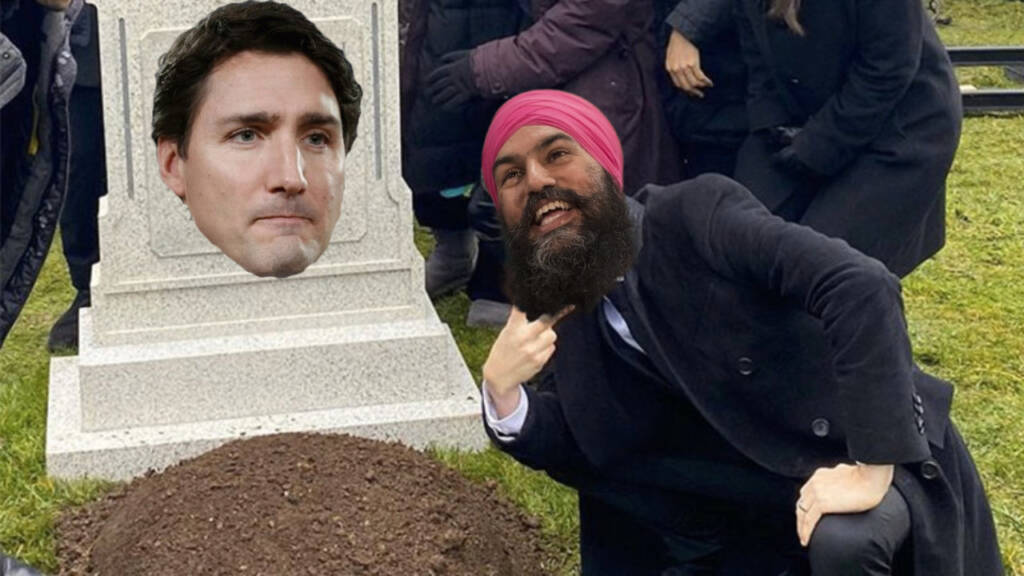Justin Trudeau’s attempt to blame India for the killing of Khalistani terrorist Hardeep Singh Nijjar at the G20 summit led to a diplomatic spat between the two nations. This confrontation resulted in the expulsion of diplomats from both sides and severely damaged Trudeau’s global and domestic standing. However, the political fallout benefits his ally, Khalistani extremist Jagmeet Singh. Let’s tell you how.
Jagmeet Singh: Trudeau’s Khalistan Compatriot
Trudeau’s consistent support for Khalistani elements in Canada mirrors past governments’ protection of individuals involved in anti-India activities. What exacerbates the situation is his competition with Jagmeet Singh, the leader of the New Democratic Party (NDP) since 2017, for Khalistani votes.
After the 2021 election, Trudeau’s Liberal Party formed a government with NDP’s support, making his government reliant on Jagmeet’s backing. Fearing the loss of Khalistani votes to Jagmeet, Trudeau actively courted Khalistani support. Now, with his government dependent on the NDP, Trudeau must accommodate Jagmeet’s anti-India stance.
Trudeau’s efforts to consolidate his own Khalistani votes and his acquiescence to Jagmeet’s agenda may strain Canada’s relations with India. In politics, small but consolidated voting blocs can make a significant difference, and Trudeau’s pursuit of these votes might risk diplomatic relations between the two nations.
Read More: Trudeau’s Attempt to Make India a ‘Pariah’ was a Tragic Flop
Jagmeet’s Ascent in Canadian Politics
In 2017, Jagmeet Singh, a 38-year-old Sikh lawyer and long-time Member of the Legislative Assembly (MLA), made history by becoming the first non-white politician to lead a major Canadian political party, the New Democratic Party (NDP). The NDP is the third-largest political party in Canada, and Jagmeet’s election as leader positioned him as the party’s candidate for the 2019 federal election, making him a prominent figure for the Indian diaspora in Canada.
His victory as the NDP leader was initially celebrated, particularly in India, where media hailed his achievement. Jagmeet emphasized his focus on addressing critical issues such as climate change, reconciliation with indigenous communities, and electoral reform.
However, controversies soon arose, with allegations of Jagmeet manipulating the party’s membership to secure his victory. Some claimed that he enrolled thousands of new members, primarily from his own community, to inflate his vote count during the party election.
Additionally, it came to light that Jagmeet had been denied a visa to visit India in 2013, allegedly due to his anti-India activities and connections to extremists. This anti-India stance has drawn attention as it mirrors the position of his ally, Prime Minister Justin Trudeau, who also faced difficulties entering India due to strained relations between the two nations.
Trudeau’s India-Canada Diplomatic Blunder
During his recent attendance at the G20 summit in India, Justin Trudeau, the Prime Minister of Canada, initiated a diplomatic incident by questioning India’s involvement in the killing of Hardeep Singh Nijjar, a move that immediately raised questions about Canada’s stance on the sensitive Khalistan issue. However, Trudeau’s efforts to draw attention to the Khalistan matter at the summit largely fell on deaf ears, leaving him without the anticipated support or condemnation he had sought from other nations.
Trudeau’s actions during the G20 summit have strained Canada-India relations, leaving them in a precarious state. To compound his diplomatic missteps, Trudeau’s attempt to rally international allies against India in the aftermath of the Nijjar case backfired, as he received lukewarm responses and even faced condemnation from leaders of countries he had hoped would join his diplomatic campaign. Additionally, he faced criticism within Canada for his handling of the situation, leaving his reputation tarnished both at home and abroad.
Trudeau’s Diminishing Popularity
Justin Trudeau, the Prime Minister of Canada, has experienced a notable decline in his popularity, particularly in the aftermath of his controversial visit to India. Canadians began expressing their discontent with Trudeau shortly after the India episode unfolded. Recent polling data has further confirmed this trend, suggesting that Trudeau may be losing favor among voters and could face a significant challenge from the opposition leader, Pierre Poilievre, if an election were held today.
Read More: Canada is officially Khalistan, India has shown it to the World
Trudeau’s recent allegations regarding India’s involvement in the killing of Khalistani terrorist Hardeep Singh Nijjar have contributed to his declining popularity. According to an Ipsos poll, 40 percent of Canadians would prefer to see Pierre Poilievre, leader of the Conservative Party, as Prime Minister. The poll indicates that, if elections were held presently, Poilievre’s Conservatives would secure 39 percent of the votes, while Trudeau’s Liberals would receive 30 percent.
This drop in popularity is a concerning development for Trudeau, especially given that a separate survey conducted in July deemed him the worst Prime Minister in over 50 years. The decline in Trudeau’s standing is partly attributed to his perceived leniency and lack of commitment in addressing Khalistani elements, often dismissing their activities as “freedom of expression.”
It is increasingly evident that Trudeau’s alignment with Khalistan supporters has not only strained Canada’s relations with India but is also eroding his own political support. Khalistani backers are more likely to rally behind Jagmeet Singh, their long standing ally, rather than Justin Trudeau. Additionally, Trudeau’s divisive policies have been driving away support from Canadian liberals, while his Khalistan controversy has pushed more supporters toward conservative alternatives. Consequently, Jagmeet Singh has effectively garnered Sikh voters, leaving Trudeau with dwindling backing in Canada.
Watch More:
https://youtu.be/XcUifVRywOQ?si=gYzbfY7-ClDMwOWS
